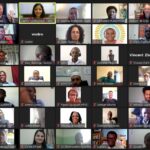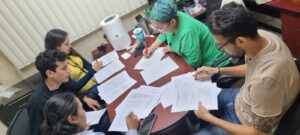
Navigating uncertainty with our partners
INASP’s executive director John Young looks back on a year where work at INASP continued against a backdrop of significant local and global challenges.
Just when 2022 looked like things might be getting back to normal, Russia invaded Ukraine leading to massive shortages of fuel, food and fertilizer, soaring inflation, many African students stranded, and reminding us how interconnected our problems are, and how much we need to find solutions together.
But there are glimmers of light. UK funding for development research is beginning to recover after major cuts in 2020 and 2021. In December the International Science Partnership fund – a successor to the Global Challenges Research Fund – was announced, though it remains unclear how much this will be focused on challenges in the Global South and partnerships with Southern researchers.
And in collaboration with our partners we made great progress in 2022.
A new focus
After a painful reshaping process in 2021, we have emerged with a more strategic, albeit narrower focus on three key areas – digital platforms and digital learning, supporting Southern research and higher education institutions, and gender-responsive knowledge systems – all of which will contribute towards our overall aim of more equitable knowledge ecosystems.
It has been an important year for learning lessons from and improving our work. With TESCEA partners we published the Transforming Higher Education for Social Change in East Africa model, to consolidate what we had learnt about how to improve teaching and learning, and to distil our approach in a series of toolkits, courses and case studies to assist other universities. The evaluation of TESCEA, and a series of learning briefs, are informing the design of the next phase, when we hope to take it to scale in East Africa.
In addition, a collaborative self-evaluation of the Global Programme for Equitable Knowledge Ecosystems (GPEKE) is informing the next phase of our AuthorAID community platform and work with our partners, including Uganda National Council for Science and Technology, has helped to establish locally-owned and led networks like the Gender Equity in Research Alliance in Uganda.
Increasing demand for online learning
Our expertise with online learning has been in high demand. We are working with GIZ to develop a short course on social protection design and delivery for practitioners in Pakistan, with IIED to help develop a MOOC on ‘pastoralism in development’, and with the ACU to deliver gender training for lecturers involved in the PEBL West Africa project. And we’ve published more than 10 years’ of our experience in digital learning in a new open-access book with African Minds: Digital Technology in Capacity Development: Enabling Learning and Supporting Change.
My own personal high points have included leading the GPEKE evaluation, working with colleagues and partners to run online and face-to-face training courses on research communication and policy engagement for the Commonwealth Scholarship Commission, the C40 Cities network on climate change, the Swedish Agricultural University Global Programme, and providing training and mentoring to research teams funded by the IDRC Growth and Economic Opportunities for Women – East Africa programme.
One INASP – our evolving organisation
2022 has also seen the expansion of our One INASP approach, including evolving the leadership of AuthorAID and the establishment of regional hubs for the community, and a growing team of Associates contributing more to our strategic thinking.
So we are looking forward to another challenging year in 2023 working with partners, Associates, Trustees and Advisers to develop AuthorAID and the services it offers, and to do more on gender-responsive pedagogy and gender equity in research.
We are also building new partnerships to scale TESCEA in East Africa, and developing more examples of what I call “mini equitable knowledge ecosystems” around specific challenges like the School-based Health Promotion Project in Jigawa and Kano States, Northern Nigeria with Hull and Bayero Universities, the ministries of health and education and the Family and Youth Health Initiative.
Image credit: Hans-Peter Gauster – Unsplash

 Previous Post
Previous Post Next Post
Next Post


